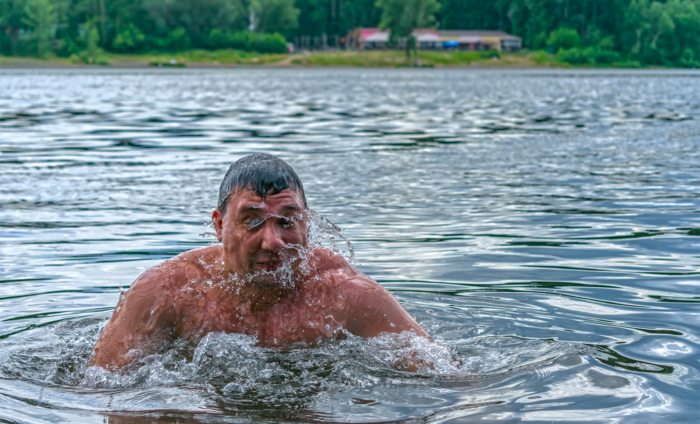
How can I control my asthma in cold water?
We asked three expert swimmers for their advice on managing asthma when open water swimming.
“My question concerns outdoor swimming and asthma. I have to use a wetsuit otherwise the cold water triggers an asthma attack. Even with a wetsuit, I have to go steady to keep my breathing under control. It is still a problem even with sea temperature at 20 degrees. Is there anything I can do to help acclimatise and control this?” – Mark, Bridport
Hi Mark,
A good place to start would be to talk to your GP and get an asthma review.
It’s important your asthma is managed as well as it can be. Any regular asthmatic symptoms are indicative of less than optimal control. However, you will need to be very specific about what triggers your asthma as many GPs won’t understand the physiological response stimulated by cold water and how it could affect your breathing – unless, perhaps, your GP is also a cold water swimmer – and this could lead to strange advice or inappropriate changes in medication
Once you are confident your asthma is properly controlled, there are measures you can take, swimming wise, that might help reduce the incidence of asthma attacks when entering cold water.
For those with exercise-induced asthma, outdoor swimming can be a trigger due to the rapid change in breathing rate and depth that cold water shock induces. Moreover, cold water shock can provoke anxiety and panic – states that will exacerbate asthma.
It’s important to remember that although wetsuits help protect you from the cold while swimming, you can still get cold water shock in one. If it’s the cold water shock that triggers the asthma, then you may be able to reduce it as follows:
1. Splashing water on your wrists and back of neck to prepare your body
2. Entering the water slowly, keep your head above water and let the cold water shock happen while taking in deeper than normal breaths to steady your breathing
3. then getting back out the water and doing a mini warm up, some arm swings, maybe a bit of very light jogging on the spot (this should only be done if they are wearing a wetsuit not in skins)
The idea behind this is that it gives the wetsuit chance to do its job and allows you time to properly adjust to the water temperature. Once you get back in, you should feel less cold and your breathing should be normal.
Another advantage with entering the water slowly and gradually immersing the body is that the cold shock response will have a smaller peak. Ensure your breathing is under control (so you can talk in sentences) before splashing water on your face. Start your swimming with slow, head-up breaststroke and only speed up or swim front crawl when you feel comfortable.
Have you considered the possibility that your wetsuit may be a contributing factor? We wondered if it would be worth trying ‘skins’ swimming to take away the restrictive nature of the wetsuit around your chest. It’s possible that the increased work required to breathe in your wetsuit in an environment that is already stressful for your breathing could make things worse. Also, if the asthma is partly anxiety induced, maybe your symptoms will decrease with more experience and frequency of swimming, which sounds like a good excuse to get in the water as often as possible.
One aspect that might be worth discussing with a respiratory physiotherapist or physician is the value of a pre-swim respiratory warm up. Asthmatic terrestrial athletes are encouraged to do a slower, more prolonged warm up to reduce the likelihood of symptoms. But, for a swimmer, this would also raise your deep body and skin temperature, and that would increase the cold water shock response. You may need to experiment to see what works best for you.
Keep in mind that outdoor swimming is more fatiguing, and more technically and environmentally challenging that pool swimming, so don’t expect to perform at the same level. What’s more, there’s a lot of bravado around swimming in cold water that sometimes isn’t helpful. Swim with people who make you feel safe and confident and aren’t out to race during every swim.
We hope this helps. Let us know how you get on.
Our advisors
Many thanks to the following for their advice in writing this article.
· Sakura Adams is an English Channel swimmer and a member of Serpentine Swimming Club
· Dr Heather Massey is Senior Lecture in Sport, Exercise and Health at the University of Portsmouth, a keen open water swimmer and an asthmatic
· Keri-anne Payne is a two-times open water world champion, an Olympic silver medallist and an open water swimming coach
Please note, Outdoor Swimmer is not qualified to give medical advice. If you have concerns about asthma or any other medical condition and outdoor swimming, you should consult a professional medical practitioner.







